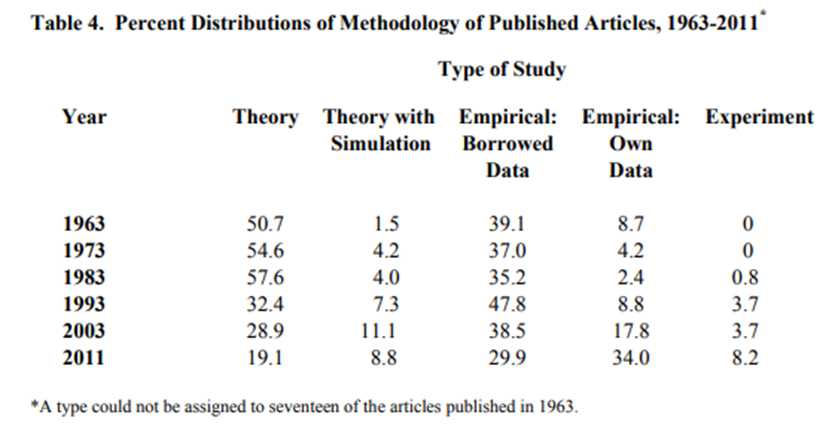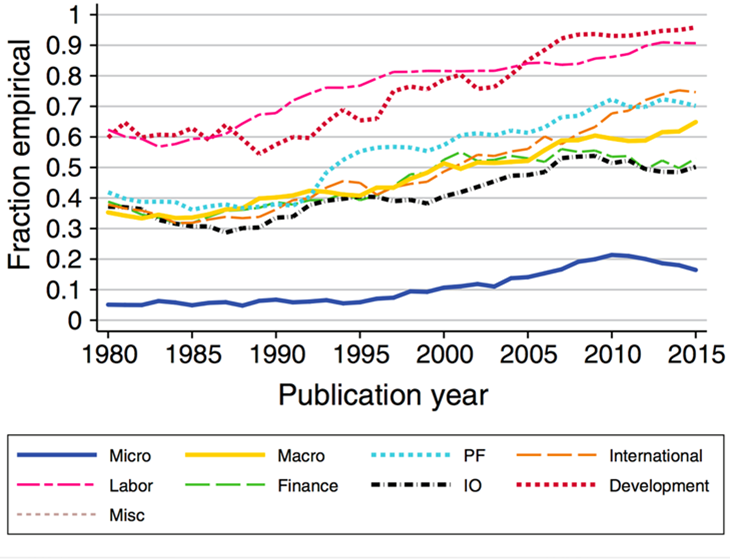
Empirical Economics: The Good & The Bad
Economic Research Hasn’t Always Been This Way
The state of economic and social science research has come a long way since it began. While sitting in a seminar about trends in the economics profession, the use of data in research was one of the topics that provoked personal thoughts. I regard myself as an empirical social scientist with a passion for people, so I’m especially interested in empirical economics. (In other words, I like numbers AND people.)
Having the capability to collect, manage, and work with data using increased public data sharing, improved methods of collection, and better solutions to storage and application of data methods is advantageous for social science and economics. On the other hand, this also warrants caution for the research implications of informing policy. This so-called “empirical revolution” has trended away from theoretical work and towards empirical research. This has brought with it a dehumanization of economics that I find concerning. Let me explain.
Some History of Empirical Economics & Econometrics
Let’s start from the beginning of mathematizing economic theory. León Walras is credited as one of the first economists and mathematicians to formally frame economic theory in mathematized models. This was quite the advancement in economic theory. This initiated the analysis of data and economic theory. Empirical and qualitative science is difficult to attribute to just a singular method, paper, or person. However, Ragnar Frisch and Jan Tinbergen were awarded the 1969 Nobel Prize for pioneering advancement in econometric modeling and measurement. This was a momentous milestone for empirical methods. Empirical economics utilizes various methods to analyze economic theory or test hypotheses using real-world data. (ie: econometrics, experimental economics, surveying, case studies, and more)
Further advancements in machine learning, technology, and data collection can also be attributed to the increasing number of empirical studies. This has been a breakthrough for the discipline over the past hundred years. But it also lends to the calculation and optimization of theory and problems that may lead researchers to make decisions based on models only without any interaction with the problems first-hand.
Empirical Economics Overtakes Economic Theory
A 2013 study in the Journal of Economic Literature by Daniel Hamermesh shows that the prevalence of purely theoretical papers is fewer and farther in between. There is also a shift towards the prominence of empirical studies (Table 4). A follow-up study, published in 2017 by Joshua Angrist and coauthors in the AER: Paper and Proceedings, expands this initial analysis to over 130,000 cited papers “in the spirit of empirical inquiry” and finds the same trend in empirical publications as shown in the graph below.
 Hamermesh (2013)
Hamermesh (2013)
 Angrist et al., (2017)
Angrist et al., (2017)
Public Data Sharing Makes Empirical Economics Possible
The advantages of data accessibility and new empirical tools offer newfound solutions to many fundamental problems within economics. Without the proper technology and econometric methods, we would be unable to study such social problems and theories. Let alone at such large scales. Data collection by governments, private companies, and other interested parties allows for more analysis of human behavior. This is particularly true through the improvement in the timeliness and accuracy of data.
The Downside of Data Collection: Losing the Human Touch
In another vein, the increased use of data analytics and empirical work may be taking the focus away from people. This “dehumanizes” the data. Researchers are increasingly able to model, analyze, and conclude findings with less interaction with data collection and less local familiarity with the areas, peoples, and problems of interest. We can study empirical problems solely from behind a screen. I worry we may be losing the “social” in social science. Additionally, empirical economics may be perpetuating the gap in understanding between the researcher and the research question. The context of these analyses is being lost in translation.
This brings me to my biggest point: this potential for a gap in understanding between data and the real-world problems being studied may lead to unsound or unrealistic policy advice stemming from empirical research findings. Without the necessary comprehensive knowledge of a subject and the data being employed, models may omit essential variables. There may be misinterpretation within a model or the findings. A lack of understanding of the entirety of the context behind data and social issues can lead researchers to derive inappropriate policy conclusions about empirical models. And it further takes away the human factor of the observations and data points being studied. This can have significant and damaging effects in informing and creating policies based on empirical findings when we begin to steer away from the humanization of these data.
Researchers Should Engage in Hands-On Data Collection
Personally collecting data encourages economists to better understand the data they’re modeling. For example, surveyors and experimentalists may get a better understanding of the individuals, environment, culture, feelings, and stories that make up the context behind the questions at hand. However, there are limitations to collecting data as this process can be costly, time-consuming, and intensive.
When researchers simply use unfamiliar or publicly available data rather than collecting the data themselves, the researcher inadvertently removes the human factor of economics and eliminates much of the nuance in the problem or solution they’re researching. A researcher navigating the opinions and feelings of individuals at the source could better understand the local and traditional knowledge of the problem in addition to empirical conclusions without this prior knowledge.
How Cardinal Approaches Economic & Policy Research
At the Cardinal Institute, our work is to improve conditions and reform policy. Our solutions take into account the best interests of those being directly impacted. Our team strives to do heavy research “offline” and on the ground to best understand all conditions and factors that affect public policy solutions.
This is one of the things that drew me to work with this organization. I felt Cardinal was putting the “humanity” back into the data. Holding focus groups to understand the emotions of those individuals of research interest and surveying locations in different capacities to better account for nuances are just some of the ways we further immerse ourselves within our priority issues. In an era of empirical analysis, improved technology, and “big data,” it’s increasingly important to find ways to engage with data and social issues outside of strictly empirical analyses. Researchers need to remember the people behind the numbers to better understand the numbers and the people they’re trying to help.
Monica Moses is a Policy Fellow for the Cardinal Institute for West Virginia Policy.









